Are you looking to boost your sales revenue in the SaaS industry?
Do you want to gain a competitive edge and close deals more effectively?
If so, investing in SaaS sales training can provide you with the necessary skills and insights to excel in this rapidly evolving market.
SaaS selling is different from selling any physical product to the world. Needs and strategies used in SaaS marketing vary from other product marketing.
In this article, we will explore the importance of SaaS sales training, its benefits, and how it can help you achieve remarkable results.
Overview: The Power of SaaS Sales Training
In today’s competitive SaaS market, having a well-trained sales team is essential to drive business growth and success.
SaaS sales training equips sales professionals with the necessary knowledge, skills, and strategies to navigate the complexities of the industry, effectively communicate the value of their offerings, and close deals successfully.
Let’s first understand the SaaS industry, and then we will explore the role of sales training in SaaS.
Understanding the SaaS Industry
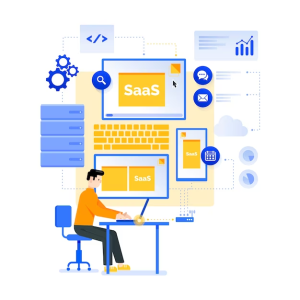
Before diving into the importance of sales training, it’s crucial to have a solid understanding of the SaaS industry.
Software-as-a-Service (SaaS) refers to a software distribution model where applications are hosted by a provider and made available to customers over the internet.
This model has gained tremendous popularity due to its scalability, flexibility, and cost-effectiveness.
The Role of Sales Training in SaaS
SaaS sales training plays a pivotal role in empowering sales teams to adapt to the unique challenges and dynamics of the SaaS industry.
It goes beyond traditional sales techniques and focuses on understanding the complexities of SaaS products, the buyer’s journey, and the art of consultative selling.
With the right training, sales professionals can become trusted advisors, providing solutions that meet customers’ specific needs.
How SaaS Training Works: Top 6 Key Components
Successful SaaS sales training programs incorporate various key components to ensure comprehensive skill development and knowledge acquisition.
These components include:
1. SaaS Sales Techniques and Strategies
SaaS sales techniques and strategies form the foundation of any effective sales training program.
This includes prospecting, lead generation, qualifying prospects, presenting solutions, negotiating, and closing deals.
Ultimately, all this implies generating high sales revenue in the SaaS market.
2. Product Knowledge and Expertise
In-depth product knowledge is essential for sales professionals in the SaaS industry.
They must understand the features, benefits, and competitive advantages of their offerings to effectively position and sell them.
With comprehensive knowledge of SaaS products, salesmen can tackle all the challenging questions coming from prospects.
3. Understanding the Buyer’s Journey
A thorough understanding of the buyer’s journey helps sales professionals align their sales approach with the customer’s needs and challenges at each stage.
That enables them to provide personalized and relevant solutions.
The SaaS salespersons can become a problem-solver from a customer’s point of view, if they understand the buyer’s journey from the beginning.
4. Effective Communication Skills
Communication skills are vital in building rapport, understanding customer requirements, and conveying the value proposition of SaaS products.
Sales training programs focus on enhancing verbal and written communication skills.
If you start your conversation with clarity in voice, clarity of thoughts, and clarity of approach, then definitely you made your prospect listen for a while.
This will give you time to convert your prospect into a final customer and you will be able to do a closed deal.
5. Handling Objections and Overcoming Challenges
Sales professionals often encounter objections and challenges during the sales process.
SaaS sales training equips them with techniques to handle objections effectively and overcome hurdles that may arise.
Proper saas software sales training will give an idea of real-life scenarios in advance, so salespeople will learn the related and result-proof salesman tricks to make a closed deal.
6. Building Long-Term Customer Relationships
Building strong, long-term customer relationships is crucial for recurring business in the SaaS industry.
IT Sales training programs emphasize the importance of relationship-building skills and customer success strategies.
You will get recurring customers, customer feedback, customer satisfaction, customer loyalty, and referrals from customers, if you put efforts in building good and long-term relationships with your customers.
Now, have a look at the advantages of SaaS sales training in your growing SaaS business.
The Benefits of SaaS Sales Training
Investing in SaaS sales training can yield numerous benefits for both sales professionals and organizations.
Some of the key benefits include:
1. Increased Sales Revenue

SaaS sales training enhances the ability to close deals, leading to increased sales revenue.
Sales professionals learn effective sales techniques, negotiation strategies, and value-based selling to maximize their sales potential.
Sales training program teaches to bear anything that comes in the path; it motivates sales professionals to work consistently, smart, and hard without giving up so quickly.
This enthusiasm in salespersons will lead them to invent unique and multiple tricks of dealing with different mindset prospects. Ultimately, all these efforts drive increased sales revenue.
2. Improved Sales Conversion Rates
With the right training, sales professionals can improve their sales conversion rates by effectively qualifying prospects, understanding customer needs, and delivering tailored solutions.
In simple terms, with sales training sales professionals will become more idols to understand the customer’s point of view.
And this social quality will help salesmen to solve all the problems of customers and that leads to converting prospects into closed deals. Like this, sales conversion rates will increase every time.
3. Enhanced Customer Satisfaction
By understanding the buyer’s journey and providing personalized solutions, sales professionals can significantly enhance customer satisfaction.
Satisfied customers are more likely to become loyal advocates for your SaaS products.
Customer recurring, customer loyalty, and customer referrals are enhanced by providing customer satisfaction.
4. Competitive Advantage
SaaS sales training provides a competitive advantage by equipping sales teams with advanced knowledge and skills.
A well-trained team can differentiate itself from competitors and position its offerings more effectively.
In a real-life scenario, nobody will trust your product just by saying that it’s best!
You have to earn trust and make your prospects believe that your service is not similar to your competitors and you are beneficial for them.
All the required skills to prove yourself and your company are different and unique can be possible with SaaS sales training.
5. Personal and Professional Growth
SaaS sales training not only benefits organizations but also contributes to the personal and professional growth of sales professionals.
It enhances their skill set, boosts their confidence, and opens doors to new career opportunities.
Salesmen will have a positive and effective thought process and number of personality-building qualities for their professional and personal life.
How To Choose Best SaaS Sales Training Program?
Selecting the right SaaS sales training program is essential to ensure maximum effectiveness and return on investment.
Consider the below-listed points at the time of choosing a SaaS sales training program:
1. Assessing Your Training Needs
Evaluate your organization’s specific training needs and goals. (Particular requirements for SaaS products)
Identify the areas where your sales team requires improvement and focus on finding a program that addresses those needs.
Because investing in every aspect is just a waste of time and waste of money. That’s why filter your sales team’s requirements for training.
2. Researching Training Providers
Conduct thorough research on different training providers.
Look for providers with experience in the SaaS industry and a proven track record of delivering high-quality sales training.
Take help from google, ask for a top list of sales training providers and check out all the reviews and feedback from past customers before finalizing any training program for your sales team.
3. Evaluating Training Content and Methodologies
Review the training content and methodologies offered by different providers.
Ensure that the program covers the essential components mentioned earlier and aligns with your organization’s sales processes.
Match all the offerings with your training requirements and then conduct the training sessions.
4. Considering Practical Application and Support
An effective training program goes beyond theoretical knowledge.
Look for programs that offer practical application exercises, role-playing scenarios, and ongoing support to reinforce learning.
Because not every employee is capable of implementing all theoretical knowledge into practical life, and visualization and practical are better ways of teaching anything than only theory.
5. Feedback and Continuous Improvement
Choose a training program that emphasizes feedback and continuous improvement.
Regular assessment and feedback sessions can help identify areas for improvement and ensure the program’s long-term effectiveness.
Let’s see how to implement SaaS sales training in your company.
Implementing SaaS Sales Training in Your Organization
To maximize the impact of SaaS sales training, follow these implementation best practices:
1. Leadership Support and Alignment
Obtain leadership support and ensure alignment between sales training objectives and organizational goals.
Leadership involvement helps create a culture of continuous learning and improvement.
With leadership, an organization gets streamlined guidance to step up, and this will enhance sales rates.
2. Customization and Tailoring
Customize the training program to suit your organization’s unique needs.
Tailor the content, case studies, and exercises to reflect your products, target market, and sales processes.
If you develop your training methods as per your company’s working strategies, then you will get more productive hours from your sales team.
3. Training Delivery Methods
Consider the most suitable training delivery methods for your team.
This can include in-person workshops, virtual training sessions, e-learning modules, or a combination of different approaches.
Visual and practical learning are always easy and best to deliver concepts better.
4. Tracking and Measuring Success
Establish metrics to track the success of the training program.
Monitor key performance indicators such as sales revenue, conversion rates, customer satisfaction, and sales team feedback.
Success measurement will encourage your sales team to maintain this energy and consistency for selling SaaS products. Also, you will know where you have to improve your strategies if your success rate goes down.
5. Ongoing Training and Reinforcement
SaaS sales training is an ongoing process.
Schedule regular training sessions, refreshers, and reinforcement activities to ensure continuous skill development and knowledge retention.
If you are aware about what is sales consulting, then contact any leading sales consulting service provider to get the best SaaS sales training contact in your city.
Now, have a look at the SaaS examples to be considered in 2023 for better understanding.
Top 6 SaaS Examples of 2023
Here, We will explore the top 5 SaaS examples of 2023 that are revolutionizing various industries and making businesses more efficient and productive.
From project management to customer relationship management, these SaaS solutions are transforming the way organizations operate.
1. DonorKite
NonProfit / Charity Software / Donation Management Software
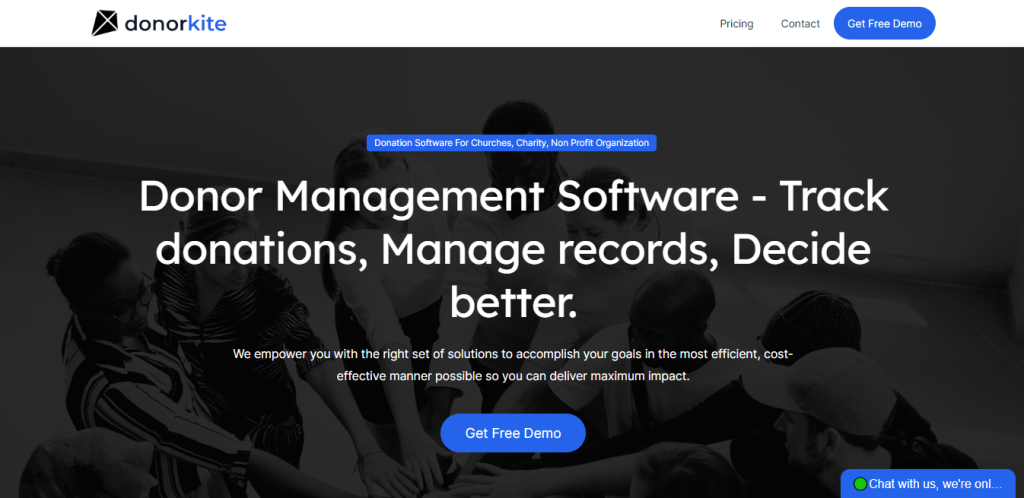
DonorKite is a comprehensive donation management and fundraising software designed to help nonprofits, churches, and charity organizations to streamline donation management.
This donor management software is available globally with a wide range of features and benefits at a very affordable price.
You can manage your bulk donations, enhance your fundraising efforts, record your donor’s information, and many more things with this SaaS software.
Let’s see the key features and benefits to understand the value of SaaS products.
Key Features Offered By DonorKite
- You can manage unlimited donations with DonorKite.
- Donation tracking is possible with this software.
- You can record the donor’s profile information such as contact number, email, and address with this software.
- You will get a donation history and report to analyze the donor’s behaviour.
- Multiple fundraising campaigns are managed by DonorKite.
- Customization feature service is available with DonorKite.
- You can send automated donation receipts immediately or at scheduled times through DonorKite.
- Team member’s data is also managed by DonorKite.
- Online payment options are available with this SaaS donation management software.
- DonorKite can integrate with multiple payment gateways and existing software of organizations.
Benefits of Using SaaS DonorKite
- DonorKite will enhance your fundraising efforts and help you to collect more donations.
- With automatic features, DonorKite will save the organization time.
- It will streamline your volunteer management with the donation management service.
- All the features of DonorKite are accessible globally.
- Through communication features, you can maintain good relationships with donors.
- Import/Export data is possible with DonorKite.
- You can analyze donations and data and improvise fundraising activities with the help of a reporting feature.
2. Slack
Communication / Collaboration Software
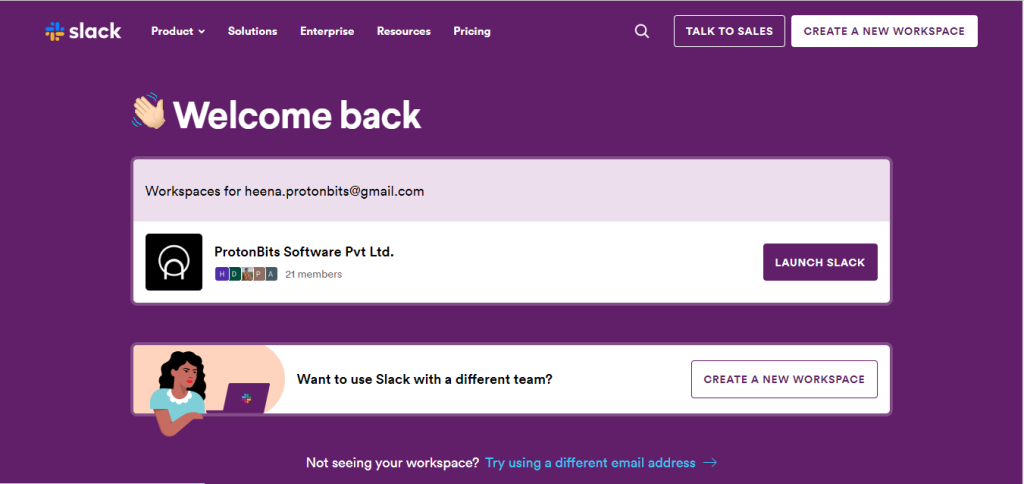
Slack is a leading SaaS platform that revolutionizes team communication and collaboration.
With its intuitive interface and extensive features, Slack allows teams to communicate in real-time, share files, and integrate with various third-party applications.
Whether you’re working remotely or in a traditional office setting, Slack keeps everyone connected and informed, improving productivity and fostering a collaborative work environment.
3. Salesforce
Customer Relationship Management Software
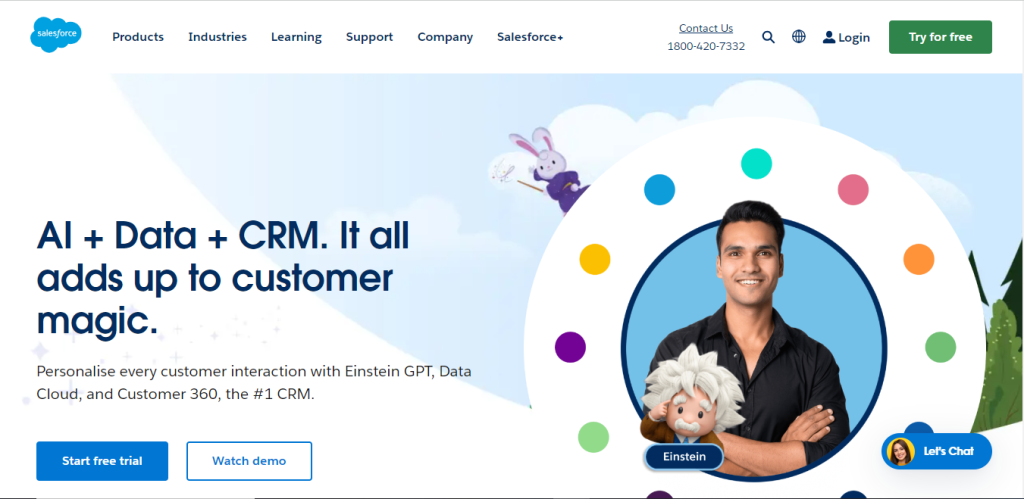
Salesforce is a comprehensive customer relationship management (CRM) platform that helps businesses manage their sales, marketing, and customer service activities.
This SaaS solution offers a range of tools and features to automate and streamline critical business processes.
From lead generation to customer support, Salesforce empowers organizations to build stronger customer relationships, improve sales performance, and drive revenue growth.
4. Shopify
E-Commerce SaaS Platform
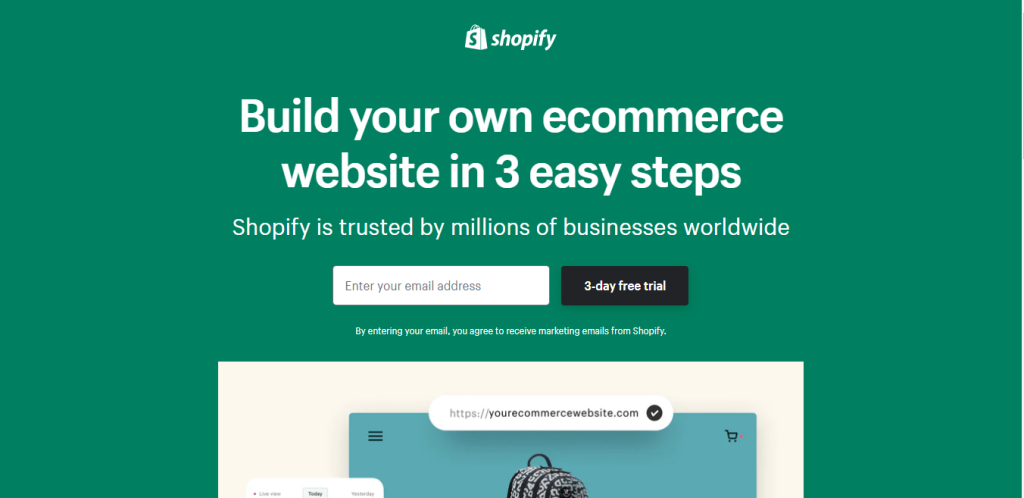
For businesses looking to establish an online presence and sell products or services, Shopify is a game-changer.
It is a powerful e-commerce SaaS platform that simplifies the process of setting up and managing online stores.
With its user-friendly interface and extensive customization options, Shopify enables entrepreneurs and small businesses to create professional-looking websites, handle inventory, process payments, and analyze sales data with ease.
5. Zoom
Video Conferencing / Online Meetings Software
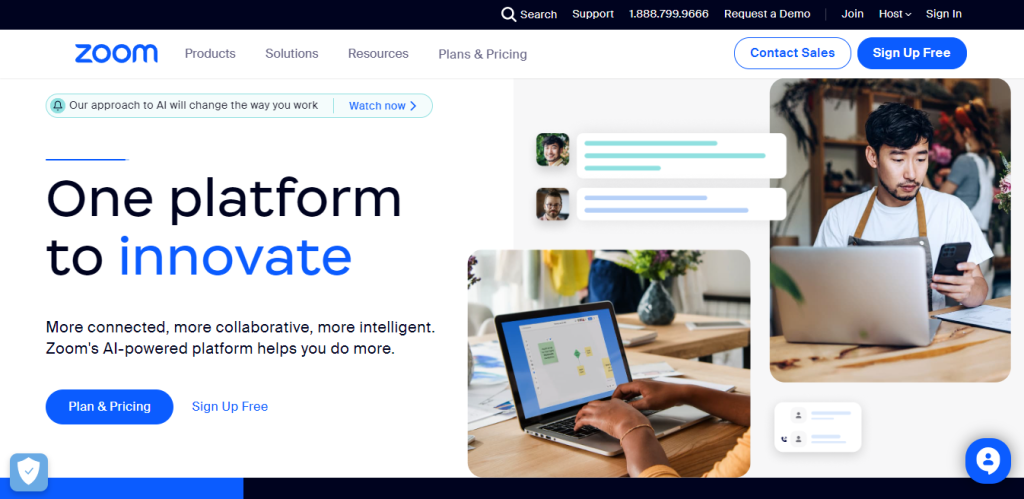
In an increasingly remote and digital world, Zoom has emerged as a leading SaaS solution for video conferencing and online meetings.
With its seamless interface and high-quality audio and video capabilities, Zoom enables individuals and teams to collaborate effectively, regardless of their physical locations.
From small team huddles to large-scale webinars, Zoom provides a reliable and user-friendly platform for virtual communication and collaboration.
6. Trello
SaaS Project Management Software
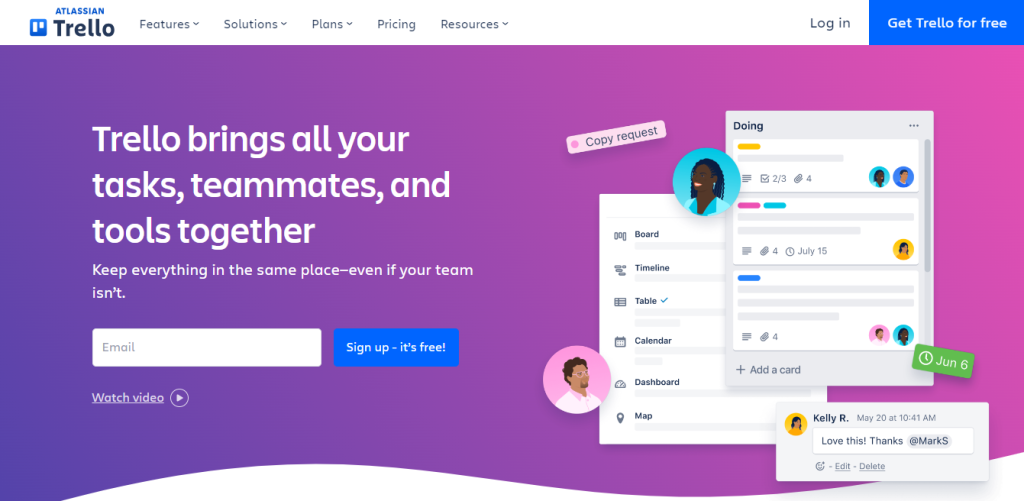
Trello is a popular SaaS project management tool that simplifies task tracking and team coordination.
With its visually appealing interface and intuitive card-based system, Trello allows teams to organize projects, assign tasks, and monitor progress effortlessly.
From small personal projects to large-scale enterprise initiatives, Trello enhances productivity, promotes transparency, and ensures that everyone is on the same page.
Conclusion
Investing in SaaS sales training is a strategic decision that can transform your sales team’s performance and drive revenue growth.
There is nothing like a waste of money if you did good research on choosing the right sales training program.
Your sales team will learn so many different things and sales techniques to sell SaaS products effectively.
Your new team members and freshers will get the right idea about your company’s needs and give you more productive hours with result-oriented approaches.
By equipping your sales professionals with the right knowledge, skills, and strategies, you can enhance their effectiveness, build strong customer relationships, and gain a competitive edge in the dynamic SaaS industry.
Right guidance and effective training of sales is the key to maximum return on investment.
Happy SaaS Sales Training!!!
Frequently Asked Questions (FAQs)
Who can benefit from SaaS sales training?
SaaS sales training is beneficial for sales professionals working in the SaaS industry, including account executives, sales managers, business development representatives, and customer success managers.
How long does SaaS sales training typically last?
The duration of SaaS sales training programs can vary depending on the depth and breadth of the training content. It can range from a few days to several weeks, with ongoing reinforcement and refresher sessions.
Can SaaS sales training be conducted remotely?
Yes, SaaS sales training can be conducted remotely using virtual training platforms, video conferencing tools, and e-learning modules. Remote training offers flexibility and convenience for distributed sales teams.
What are the costs associated with SaaS sales training?
The costs of SaaS sales training programs can vary depending on the training provider, program duration, customization requirements, and the number of participants. It is advisable to request quotes and compare offerings from different providers.



